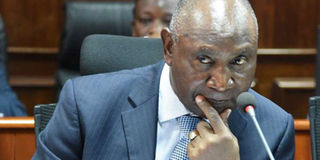Why appointment of Auditor-General may take longer than expected

The then Auditor-General Edward Ouko reacts during a meeting with the Senate's Public Accounts and Investment Committee on special pending bills, July 29, 2019. PHOTO | DIANA NGILA | NATION MEDIA GROUP
What you need to know:
- The President was required to submit a nominee to the National Assembly for vetting following conclusion of interviews by the Public Service Commission (PSC).
- But it has emerged that President Uhuru Kenyatta is not comfortable with the list submitted to him for consideration.
- The fact that the National Assembly will start its long Christmas recess on Thursday, without approving the name of the new Auditor-General, means the process will drag on at least into the first three months of 2020.
The delay in appointing an Auditor-General has technically grounded operations at the national audit office but the process may take longer than expected.
Edward Ouko exited the office on August 27 after his eight-year non-renewable term ended.
The fact that the National Assembly will start its long Christmas recess on Thursday, without approving the name of the new Auditor-General, means the process will drag on at least into the first three months of 2020.
NAMES
The President was required to submit a nominee to the National Assembly for vetting following conclusion of interviews by the Public Service Commission (PSC).
According to PSC Chairman, Mr Stephen Kirogo, a list of 17 individuals who were interviewed was sent to the President. According to the Public Audit Act, President Uhuru Kenyatta is required to pick one and forward it to the National Assembly for vetting.
“The names were ranked according to performance. We expect to have a new Auditor-General by January next year,” Mr Kirogo told the Nation on phone on Wednesday.
But the house is expected to have returned from the recess by February, so approval of the appointment may take place in March.
AUDIT REPORTS
Meanwhile, it has emerged that the President is not comfortable with the list submitted to him for consideration.
“We are in for another long haul,” a member of the Committee on Public Accounts (PAC), one of the consumers of audit reports, said, dampening spirits on the possibility of expediting the process.
Mvita MP Abdulswamad Shariff, who chairs the Public Investments Committee (PIC) that also consumes audit reports, warned that the office cannot undertake procurement and produce the reports for various government offices because of lack of a substantive office holder.
“We should have the new office holder so that we don’t lose the audit process. No new audit reports can be generated because the AG’s signature is required,” Mr Shariff said.
PROCUREMENT
The Auditor-General is the accounting officer of the organisation, according to the Public Procurement and Disposal Act.
The law further provides that for the office to make any procurement above Sh100 million, the signature of the accounting officer is required.
Although the office has seven deputy Auditor-Generals, Article 229 of the Constitution provides that some functions can only be performed by a substantive office holder.
Mr Shariff further noted that the delay will cause panic in the area of financial reports of State corporations listed in the Nairobi Securities Exchange.
Such reports are to be audited before they are shared with shareholders during their various Annual General Meetings (AGMs).
Besides being unable to churn out signed audit reports of government institutions including ministries, departments and agencies, and to undertake procurement, the office cannot renew leases of, for instance, vehicles used in the regional offices.
The office also cannot be represented during meetings of accounting officers and proceed with construction of its office block.
SHORTLIST
About 10 of those shortlisted are officials at the Auditor-General’s office.
They include Deputy Auditor-General William Agunda, David Gichana, Edwin Kamar, Sylvester Kiini, Alex Rugera, Nancy Gachungu, Dennis Kariuki, Leonard Lari, Elizabeth Mwathi and Francis Njenga.
The courts have so far ruled that the executive cannot appoint an acting auditor-general following a petition filed in court by Transparency International- Kenya (TI-K).
Among the reports, which have been concluded but cannot be released because they have not been signed by the Auditor-General include those from Central Bank of Kenya (CBK), Capital Markets Authority (CMA), Ethics and Anti-Corruption (EACC), Kenya Power (KP), KenGen Plc and East African Portland Cement PLC.





